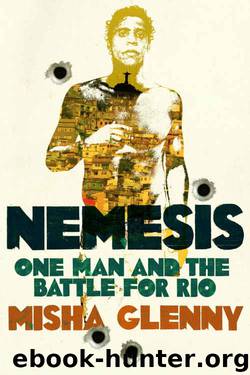Nemesis: One Man and the Battle for Rio by Misha Glenny

Author:Misha Glenny [Glenny, Misha]
Language: eng
Format: epub, azw3, mobi
ISBN: 9781448181575
Publisher: Random House
Published: 2015-09-16T21:00:00+00:00
3
TAKING CARE OF BUSINESS
2004–2007
THE BUSINESS STILL requires a lot of work. The suppliers are not the only ones demanding money.
Rocinha’s drugs trade employs 200–300 people, divided quite strictly into a number of different functions. The most low-level employees are the lookouts, the olheiros. Unless you live in the favela, or at the very least are well acquainted with favela culture, you will never spot them. They stand at, or wander around, key points of the slum, watching for any untoward or unusual activity, such as a police incursion or a threatening, suspicious or simply unfamiliar face. Their signals are shouts, whistles, squawks, fireworks, waves and laughs – sounds that send a message from street corners to windows perhaps one, perhaps two floors up. From there the information zips along the stick-narrow alleys, through the lanes and up the hill until it reaches the district organiser.
Traditionally, the olheiros are boys, some as young as eight years old, stepping on to the first rung of the business. In the 1980s and 1990s, school was often an optional activity for the children of the favela, and the kids had plenty of time on their hands. That would change later, although to this day Rocinha has one of the poorest rates of school attendance in Rio.
Nem quickly reaffirms Lulu’s law that nobody under the age of sixteen may join the business, although managers sometimes secretly take on underage kids as lookouts nonetheless. The younger they are, the more unobtrusive they appear.
Then comes the processing of the drugs. Young women and men are employed on a freelance basis in small houses and flats known as endolaçao centres, ‘dollar’ houses, so-called because the drugs are divided into little sachets each worth a single real or dollar. With the increase in prices, they have different names: ‘Coke for 10’ or ‘Dope for 5’.
From the dollar houses, the drugs are distributed around the districts of Rocinha by the vapores, delivery men who scuttle around the favela making sure that the smoke shops are well stocked. They are paid on a piece-rate basis.
The sub-managers are responsible for the day-to-day running of a small area, usually comprising one smoke shop. Their most crucial role is compiling the accounts for their shop.
Senior managers have entire districts under their control. They have to ensure that the right drugs are sent to the right smoke shops. They also collect the money at the end of the shift and present accounts to the vice dons or the Don himself.
The sale of drugs is a 24-hour operation, although business is fairly slow between about 8 and 11 a.m. Nem notices that because the managers and sub-managers, who do most of the work, are salaried, their earnings are not much higher than those in legitimate employment. The vapores, by contrast, are pulling in much bigger figures.
As Saulo points out, the structure of the Rocinha business is unique in that ‘the vapores are not attached to the smoke shop’. They work freelance and not as employees. Within a matter of weeks, Nem issues an order.
Download
Nemesis: One Man and the Battle for Rio by Misha Glenny.azw3
Nemesis: One Man and the Battle for Rio by Misha Glenny.mobi
This site does not store any files on its server. We only index and link to content provided by other sites. Please contact the content providers to delete copyright contents if any and email us, we'll remove relevant links or contents immediately.
| Arms Control | Diplomacy |
| Security | Trades & Tariffs |
| Treaties | African |
| Asian | Australian & Oceanian |
| Canadian | Caribbean & Latin American |
| European | Middle Eastern |
| Russian & Former Soviet Union |
The Secret History by Donna Tartt(19035)
The Social Justice Warrior Handbook by Lisa De Pasquale(12183)
Thirteen Reasons Why by Jay Asher(8885)
This Is How You Lose Her by Junot Diaz(6873)
Weapons of Math Destruction by Cathy O'Neil(6261)
Zero to One by Peter Thiel(5784)
Beartown by Fredrik Backman(5734)
The Myth of the Strong Leader by Archie Brown(5495)
The Fire Next Time by James Baldwin(5426)
How Democracies Die by Steven Levitsky & Daniel Ziblatt(5211)
Promise Me, Dad by Joe Biden(5141)
Stone's Rules by Roger Stone(5080)
A Higher Loyalty: Truth, Lies, and Leadership by James Comey(4947)
100 Deadly Skills by Clint Emerson(4915)
Rise and Kill First by Ronen Bergman(4776)
Secrecy World by Jake Bernstein(4739)
The David Icke Guide to the Global Conspiracy (and how to end it) by David Icke(4697)
The Farm by Tom Rob Smith(4501)
The Doomsday Machine by Daniel Ellsberg(4482)
